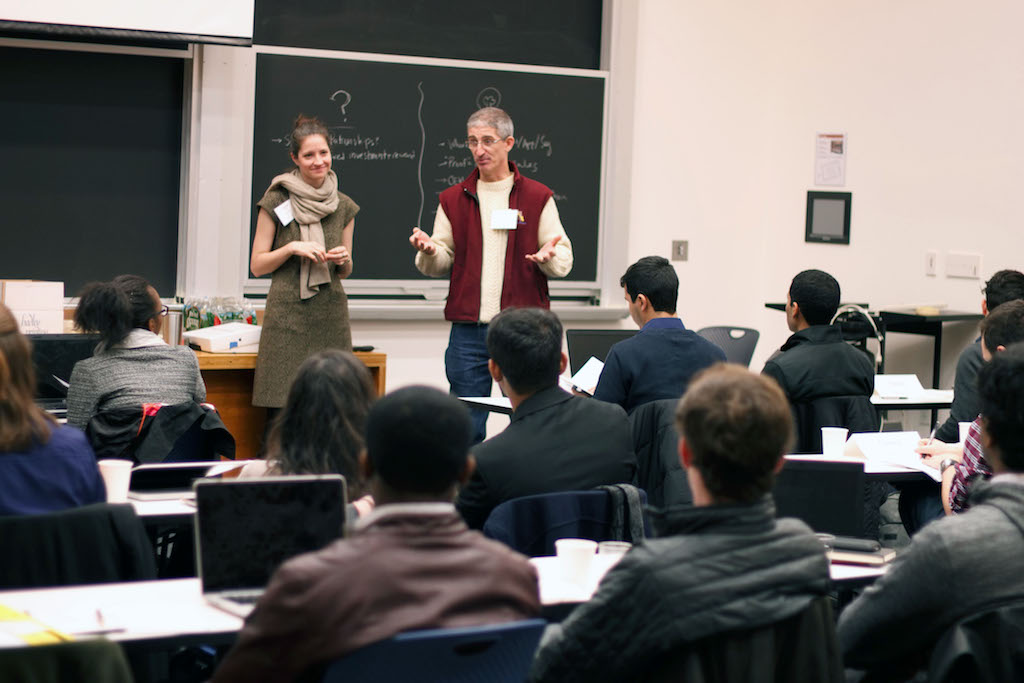
Transforming an energy-related innovation into a venture is challenging. For starters, it’s difficult to account for highly diverse and heavily regulated energy markets, causing early-stage innovators to make false assumptions about their innovation, customers, and business plan. Even if innovators are aware of the challenges in energy entrepreneurship, navigating the complex web of policies, regulations, funding sources, and paths to market can be overwhelming. That’s why energy innovators need support that’s tailored to the unique hurdles they face.
We recently spoke with Janine Elliott, Senior Program Officer at VentureWell, and Deborah Stine, Associate Director for Policy Outreach for the Scott Institute for Energy Innovation at Carnegie Mellon University, about ways faculty and entrepreneurial support organizations can prepare early-stage innovators for the energy entrepreneurship opportunities and obstacles ahead.
Encourage Students to Investigate Regulatory Variables
Regulation can be a major obstacle for energy innovators. While medical innovations also face regulatory challenges, the FDA ensures the rules and regulations are consistent at the national level. Energy innovations, however, face varied policies at the state or regional levels. “Many energy entrepreneurs make the false assumption that the dynamics of their home-market or local utility will apply nationally or internationally,” said Elliott. Stine adds, “The energy policy system is very complicated, and it’s always changing. Understanding the complexities that exist within an energy niche will help guide innovators toward the paths of least resistance, and invent solutions with those policies in mind.”
One way to help innovators see a more full picture of their regulatory obstacles and opportunities is to perform a non-market analysis. Stine explained, “Policies influence the ability of a product to reach its full potential in the marketplace. Something that’s a subsidy for several years might not be subsidy down the road. You have to take that uncertainty into account.” By examining energy policies and regulations, students can get a more holistic sense of their technology’s viability in the market. This analysis will show innovators the policies they can take advantage of while alerting them to potential barriers.
Prepare Students for the Resource-Intensive Realities of Their Energy Entrepreneurship Journey
For passionate energy innovators seeking to create a scalable energy innovation, faculty and mentors can help innovators recognize that their journey will be a long-term commitment. Energy-related technology can be very time consuming–and capital intensive–to develop and scale-up. Innovators must prove that their inventions will be reliable, durable, and safe while delivering energy at peak efficiency over the course of several decades. Thus, energy innovations not only require significant research dollars in the lab, but they need field tests, iterations, demonstration pilots, and then a few initial sales before reaching scale-up.
Speaking of sales, those can sometimes take a while to secure. Customers of energy innovations can be conservative buyers. They require much of the R&D and proof-of-concept work to be completed before they’ll commit to a purchase. A slow sales process can also make fundraising a tough sell to investors. Elliott adds, “For credibility with buyers, investors, and government funders, it’s critical for innovators to demonstrate lab-to-scale efficacy because future stages of development require high-stakes investment of both time and money from all parties.”
Faculty and mentors can be of great value by encouraging innovators to explore and understand the value chain and financial impact of their innovation within the context of several collaborators — including the utility, the rate-payers, regulators, politicians, and equipment manufacturers. “This exercise can expose key advantages or huge hurdles that will help innovators discover which regional markets might be willing to purchase – or have the infrastructure to adopt – innovations more easily. This allows innovators to enter the market faster and, ideally, with fewer resources,” added Elliott.
Push Students to Engage with Industry Sooner Rather than Later
In light of fewer financial incentives for traditional angel and venture capital investors, corporate partnerships are becoming important resources for energy innovators. Startups need help building their businesses. Corporations are seeking cutting-edge inventions that align with their strategies.
Faculty and the broader entrepreneurial support community are often catalysts for these connections, helping promising students enter the corporate development pipeline. “Many teams graduate before they even reach the later development stage, so they’re not eligible for certain programs without their student status. It’s really important for faculty and mentors to guide them toward incubators and accelerators,” said Stine. “These programs can help innovators make those industry connections. The corporations also appreciate that the startups have been coached and vetted. That shows them that the startup is more prepared, but also serious about making their idea into a real company as opposed to just a class project.”
According to Elliott and Stine, organizations like Greentown Labs, a Massachusetts-based incubator, are best equipped to leverage industry support to identify and advance prototype-stage startups addressing energy needs of their corporate partners. As Stine elaborates, “Often times, these programs are more mentorship focused as opposed to providing investment. But, ideally, that corporate partner might become the startup’s first customer. Corporate partnerships can also take an idea or venture to a new market that wasn’t initially considered. That’s not something startups can often do on their own.”
While there are countless pressing energy problems to solve, faculty and entrepreneurship mentors can help prepare innovators for their long and winding energy entrepreneurship journey. From regulatory hurdles to steep sales curves, educators and mentors can provide innovators with much-needed reality checks, industry insights, and corporate introductions.
Are you a student with an energy innovation? Learn more about the E-Team Program.
Are you part of an energy or mobility startup in Michigan looking to validate your business model while preparing for funding in the next phase of your business? We invite you to apply to the Ascend Energy & Mobility Accelerator, powered by VentureWell, TechTown Detroit, and DOE’s EPIC Prize! Learn more.